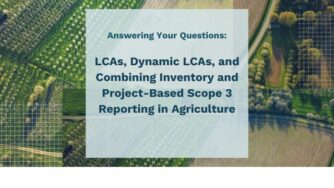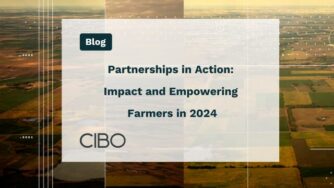CIBO Technologies welcomes guest blogger Dawson Schmitt. Please find him on social media and follow his blog, The Heartland Report.
Sustainability. We have heard the repetition of this term repeatedly; in the classroom, the news, and seminars. Sustainability “helps us balance the goals of environmental, economic, and societal opportunities for present and future generations while maintaining—and even enhancing—the quality of the farmland.” The importance of sustainability comes from increasing productivity levels for yield in current production while also maintaining the soil’s health. Together these allow the land to be workable for future generations.
While many think of sustainability as an idea constructed into modern agricultural philosophy, the concept has been around for centuries. Understanding the concept and tracing it to the source allows us to know where we are and where we can be as an industry.
The Source of Sustainability
An early record of history reveals that the term “sustainability” was first coined by a Saxon in the early 18th century, calling it “nachhaltigkeit,” the german word for sustainability1. It was initially related to forestry as the “ability to constantly exist.”
The 1943 to 1947 Yearbook of Agriculture discusses soil as a priority that goes hand in hand with human welfare. Hired for research, Dr. Curtis F. Marbut came to the United States Department of Agriculture (USDA) in 1904. His main concern was the soil. He recognized that productivity and usefulness in agriculture began with the earth itself. Dedicated to advancing soil health and providing the dirt with sufficient nutrients to support plant growth, Dr. Marbut laid the foundations for soil mapping and classification. Since then, researchers have built on and improved his original classifications and understanding.
The 1964 Yearbook of Agriculture shows that the United States was still working to find and experimenting with resilient practices that protect our current food system while moving forward for future productivity.
Formalizing Sustainability: The UN & USDA
The USDA’s philosophy of sustainability said, “many countries recognize that conservation of soil and water is a key to food production for growing populations, and soil must be kept productive year after year.” Furthermore, they understood that “[controlling] erosion is a fundamental consideration because not even a good crop of grass seed, an indispensable item in any soil conservation project, can be grown on eroded land.”
The USDA outlined four objectives for sustainability, soil conservation and land use:
- Controlling soil erosion and preventing soil degradation
- Using better soils for efficient crop growth that achieve economic stability for producers
- Converting land no longer suitable for crops to pastures, forestry, recreation, wildlife, etc.
- Protect soils that may be useful for future demand in a particular commodity they can support
Fast forward a couple of decades. The term “sustainable development” was coined in 1987 by the United Nations. It was created to advance a modern definition of sustainability. This modern idea of sustainability encompasses the idea that production shall meet our society’s needs today while simultaneously protecting resources for future uses by the generations to come.
The Survivability of Sustainability
Sustainable practices have served as a powerful resource for farmers, maximizing yields and profits. Producers have been able to work with each other, bouncing ideas off of one another and learning what works and what doesn’t in different locations.
Additionally, when a practice is proven to protect the environment while benefiting the producer effectively, agronomists and farmers from foreign countries often travel to the United States to learn these practices and bring them back home. U.S. farmers and agronomists will do the same. Such knowledge sharing helps to accelerate the awareness and adoption of successful practices.
Skepticism Drives Advancement
For the past half-century, there has been an emphasis in agriculture to favor industrialization. Despite the significant technological, biological, engineering and operational advances like GMOs and hybridized crops, better herbicides, and animal feed efficiency there is still some public skepticism of the efficacy of these practices throughout their entire growth, distribution, processing and consumption lifecycle.
With more technological advancements, some consumers and ethicists share concerns over the integrity of new technologies in agriculture. While new products and practices have demonstrated the potential to increase yields, there is also concern about unforeseen and downstream consequences for health and the environment. Pushback from consumers became an unintended consequence of groundbreaking advances in agriculture.
Recognizing the need for sustainable agricultural practices is a consequentialist philosophy. Every decision made in agriculture comes with a consequence; intentional or not. Producers practicing sustainability weigh their decisions and their possible ramifications. When the Saxons thought about sustainability, they wanted to conserve what already exists while moving forward. Today, farmers and ranchers are doing the same by finding out what works for their operation in their location—harnessing the benefits that regenerative practices provide – and reaping stability for their land, their yield, their bottom line and, ultimately, the earth.
One of my college professors would say that physics happens whether I know the equation or not. Like physics, sustainability is a concept and practice that humans constructed to describe and prescribe actions with predictable outcomes. Both physics and sustainable agriculture can take place without humans’ help. By actively inserting ourselves into the equation, we can create, accelerate and guide the benefits of regeneration for both the environment and our society.
- Caradonna, Jeremy L. Sustainability. Oxford: Oxford UP, Incorporated, 2014. Web.
About Dawson Schmitt
Dawson Schmitt is a student at Iowa State University studying Agricultural Communications. He operates a blog called The Heartland Report.



